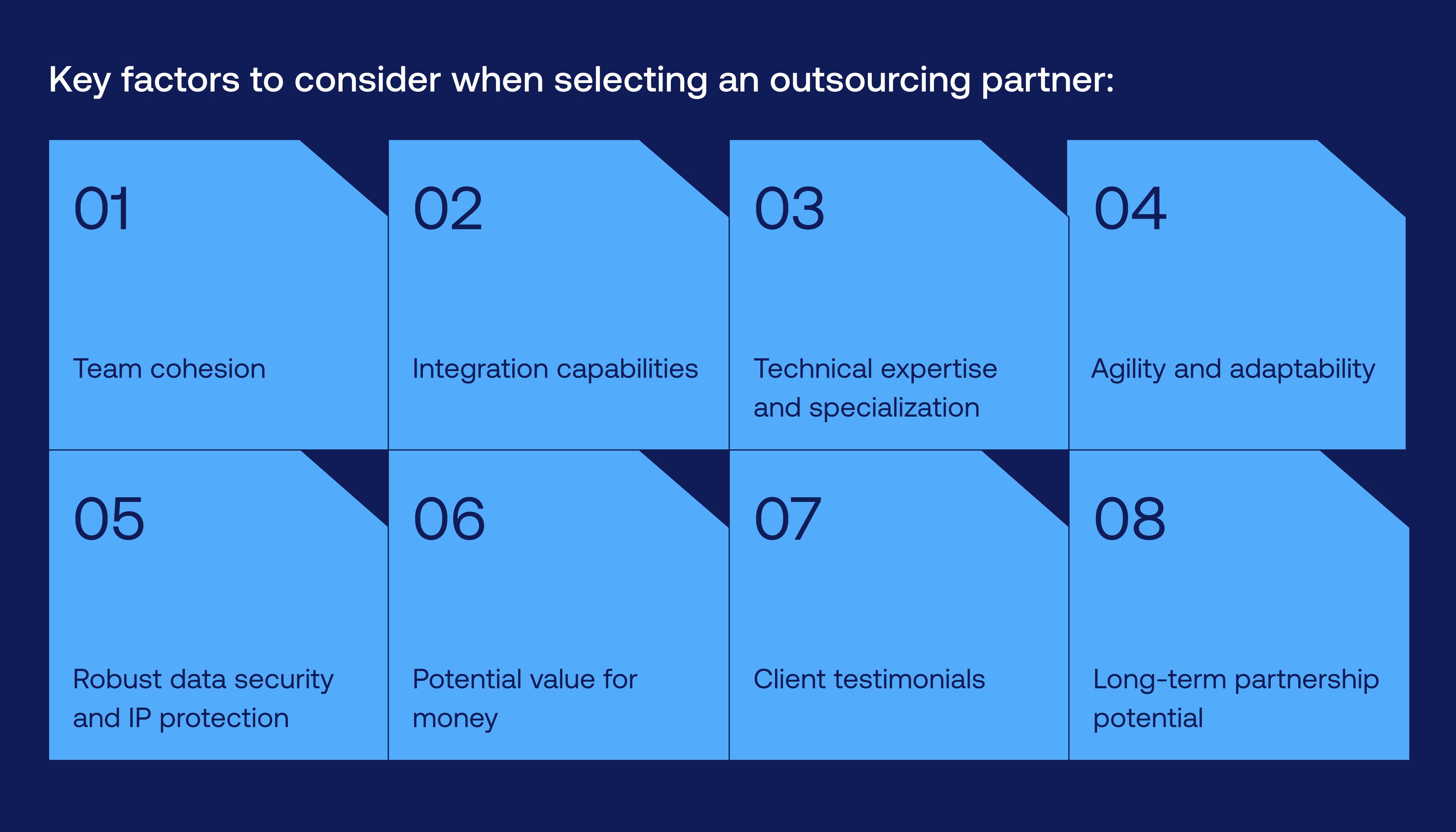
In-house software development vs outsourcing: How to choose the right option for your business

Editor's note:
In the article, Yulia provides insights on choosing the most effective resource strategy based on Vention's 20+ year track record in software project delivery. She explores the pros and cons of both in-house software development and outsourcing models and examines critical selection criteria — all with the support of Konstantin Tsybulko, CRO at Vention.
If your mind is made up and you want to proceed with software development outsourcing, contact us for extra insights or a quote.
All companies — sooner or later — hit a familiar fork in the road: Is it better to invest in in-house software development or hire an outsourced development team? Sure, the decision depends on your budget, project timelines, and your team's skill set, but the good news is that there are some clear rules of thumb for nailing this choice.
With over 20 years of experience creating software solutions for global powerhouses like ClassPass, Dialogue, and Thirty Madison, and collaborating closely with their in-house teams, our experts have a deep understanding of when to opt for in-house software development vs outsourcing — at any given stage of product development and business growth.

Konstantin Tsybulko, CRO at Vention
In-house software development vs outsourcing: pros and cons
Amidst a landscape of economic uncertainty — marked by tech industry layoffs, ongoing global conflicts, and a looming recession, all accelerated by the rapid advancement of AI — business leaders are increasingly gravitating towards more flexible, unconventional work models.
"The advancements in technology and project management tools have significantly nudged the world towards embracing remote work, a movement that gained extraordinary momentum during the pandemic."
Echoing this shift, Forbes reports that 98 percent of employees are now looking for opportunities to work remotely at least some of the time. Consequently, there has been a significant uptick in outsourcing: IT outsourcing spending has reached almost $519 billion in 2023, representing a 22 percent surge from 2019's figures.
But even as the allure of software development outsourcing grows, in-house engineering remains a cornerstone for numerous businesses, especially for sensitive projects where keeping code and operations internal is paramount. In our analysis, we’ll delve into the performance of in-house development vs outsourcing across various aspects, such as cost, communication, training, and transparency, helping businesses weigh their options in these transformative times.
Recruitment and training
-
Greater control over the hiring process: With an in-depth knowledge of the company’s culture and specific skills needed, the in-house team can conduct a more finely-tuned and bespoke hiring process that aligns closely with business objectives.
-
Customized training: In-house teams can be trained specifically for your company's tools and processes, ensuring high integrity and understanding of your business needs. Plus, you have direct control over the training process, allowing for adjustments and specialization in line with project needs.
-
Consistency in knowledge: In-house training ensures consistent knowledge and expertise across teams — a crucial requirement for complex or long-term projects.
-
Higher сosts: Training and developing an in-house development team can be costly in terms of both time and resources.
-
Time-сonsuming process: It sometimes takes months to recruit and train employees, which can delay project start times. In 2023, the average time to hire an employee is 44 days.
-
Limited talent pool: Your location may impact the range of available talent, potentially limiting your options for finding the required skills.
-
Retention challenges: Hanging onto our in-house stars can be tough. There's a lot of competition out there, and you might not be able to keep your top players around indefinitely.
-
Access to a wider talent pool: When you outsource software development, you can tap into a diverse pool of expertise unavailable locally.
-
Reduced training responsibility: The outsourcing firm manages staff training and upskilling, reducing your business's training obligations.
-
Quick availability of talent: Outsourcing enables rapid access to skilled professionals, cutting down the time needed to kick off projects. (Case in point: At Vention, projects typically start within two weeks.)
-
Difficulty in finding the right partner: The challenge lies in identifying a suitable outsourcing partner from the start rather than having to transition from one outsourcing partner mid-way through software development.
- Possible knowledge transfer issues: You could run into a few snags trying to pass on your unique company expertise to an outsourced crew.
Costs
-
Control over budget: Direct control over the development process allows for more predictable budgeting and cost management.
-
Building internal strength: The money spent on hiring and nurturing talents enhances your internal capabilities and assets — a solid investment for your future.
-
Higher initial costs: Salaries, benefits, training, and infrastructure for an in-house team often result in higher upfront costs, which might not be the right approach for a startup.
-
Fixed costs: Fixed costs like salaries remain constant, even when project demands don't, which potentially leads to underutilization of resources during downtime.
-
Lower overall costs: Outsourcing a software developer can be up to 63 percent more cost-effective (you can save as much as $100 an hour!) than hiring one in-house in the US. Add in the costs of recruitment, training, and infrastructure development — and costs spiral even higher. (For context, with Vention, clients save up to $600K per year on average.)
-
Flexible spending: With outsourcing, you adopt a pay-as-you-go model, allowing you to adjust expenses based on project needs.
-
No long-term commitments: Your company avoids long-term financial commitments (like benefits) associated with permanent employees.
-
Reduced overhead: Outsourcing shifts the responsibility of handling overhead costs, such as maintaining office space and equipment, onto the service provider.
-
Potential for hidden costs: Outsourced contracts might carry hidden costs, including charges for extra services or penalties for making changes to the project.
-
Less direct control over cost efficiency: You have less control over how the team manages and utilizes resources.

Expertise
-
Long-term skill accumulation: In-house teams gradually build up specialized knowledge and skills specific to your business and sector, directly benefiting your business.
-
Easier knowledge sharing: Proximity and constant interaction foster effective knowledge sharing and skill development within the team.
-
Over-reliance on key staff: The success of projects can become too dependent on specific individuals or small teams in in-house settings.
-
Longer turnaround times: Lacking external expertise may slow down project timelines and reduce overall efficiency.
-
Resource-heavy training: Developing and maintaining a skilled in-house team requires significant time and financial resources.
-
Fresh perspectives: Outsourcing specialists bring a new viewpoint to your processes and potentially bring innovative approaches to the table.
-
Access to rare expertise: Outsourcing allows access to a broader range of professionals with specific, often rare, technological skills needed for specific projects or tasks.
-
Dependency on vendor’s expertise: Your project's success heavily depends on the outsourcing vendor’s level of expertise and commitment to quality.
-
Risk of knowledge discontinuity: In outsourcing, there's a risk of knowledge discontinuity if the vendor changes staff.
-
Training for project-specific needs: Some projects may require training temporary workers on historical or confidential information known only to internal employees.
Flexibility
-
Adaptability to company shifts: In-house teams can quickly pivot project directions and priorities since they are directly integrated within the company.
-
Enhanced control: Maintaining an in-house team allows for a tighter grip on the development process and project management, ensuring alignment with company goals.
-
Scaling limitations: Expanding or reducing an in-house team quickly in response to project demands can be challenging and time-consuming.
-
Easy scaling up and down: Outsourcing can provide greater flexibility in scaling your development team up or down based on project needs or demand fluctuations. It allows businesses to engage expertise on a per-project basis without a long-term commitment.
-
Operational flexibility: Outsourced teams can provide a more adaptable operational approach, adjusting to new project requirements or changes on the go.
- Less flexible response to change: Engaging an outsourcing partner may lead to dependency on external vendors for critical project changes or updates, which might make your business less flexible in terms of rapid response and adjustments.
Time management and communication
-
Direct communication: In-house teams allow for real-time, direct communication, which can lead to quicker decisions and issue resolution.
-
Easier coordination: Coordinating meetings, brainstorming sessions, and regular check-ins are typically easier with in-house teams.
-
Immediate attention to issues: Outsourced teams can quickly pivot and address urgent issues, which results in better control over time-sensitive tasks.
-
Restricted working hours: In-house teams usually operate within standard working hours, which may delay urgent projects.
-
Increased risk of burnout: Managing all aspects of a project in-house can lead to staff burnout, especially during the intensive project phase.
-
Round-the-clock work potential: Partial outsourcing to different time zones can enable 24-hour work cycles, potentially speeding up project timelines.
-
Dedicated teams for specific tasks: Outsourced teams specializing in certain tasks can free up in-house resources for core activities.
-
Access to established workflows: Outsourcing firms often have established, efficient workflows that can be utilized for better time management.
- Time zone challenges: Working across time zones may cause communication delays and scheduling challenges, though modern project management tools are mitigating this issue. (Tip: For time-critical projects, consider nearshore development like Vention's development hub in Mexico, which effectively serves clients in the western hemisphere.)
Alignment with company culture
- Stronger alignment with your values: In-house employees are deeply immersed in the company's culture, which fosters a more robust connection with the company's values, vision, and mission.
-
Limited cultural diversity: In-house teams may offer a more limited range of perspectives. This potentially hinders innovation and creativity compared to more diverse outsourcing options.
-
Risk of groupthink: A close-knit in-house team might fall prey to groupthink, leading to consensus over critical evaluation and potentially suboptimal decision-making.
-
Exposure to diverse perspectives: Outsourcing introduces different cultural perspectives to your projects, which can foster innovation and bring fresh insights.
-
Elevated team intimacy: Hiring a dedicated team enables the in-house squad to concentrate on internal relationships, cultivating a more intimate team environment.
-
Integration challenges: Integrating an outsourced team with your company’s culture can potentially lead to misalignments in work style and communication.
-
Need for effective onboarding: It will probably take a bit more time and effort to fully onboard your outsourced team in tune with your company's goals and culture.
Quality
-
Quality consistency: Maintaining an in-house team ensures consistent quality standards throughout the development process, resulting in a more uniform product output.
-
Quality control in your hands: In-house teams allow for a more hands-on approach to quality control, which aligns closely with your company's standards and expectations.
- Risk of quality plateau: Relying solely on an in-house team can sometimes lead to innovation stagnation, as the team might not be exposed to evolving industry trends and external best practices.
-
Global quality standards: Outsourcing provides exposure to global quality standards and practices, which can elevate the overall excellence of your projects.
-
Quality driven by competition: As outsourcing firms operate in a competitive market, they tend to uphold the highest possible quality standards to attract and retain clients.
"When you bring on a technology partner, it's not just about the usual full-time job responsibilities,” Konstantin points out. “The legal agreements often impose even stricter obligations and conditions, which ensures a rigorous adherence to the agreed quality standards."
- Quality alignment issues: It can be a bit of a balancing act to ensure outsourced teams understand and deliver in line with your specific quality expectations.
Let’s compare the in-house software development and outsourcing models in terms of recruitment, cost, expertise, time efficiency, cultural fit, and quality.
| In-house development | Software development outsourcing | |
| Recruitment and training |
Pros
Cons
|
Pros
Cons
|
| Costs |
Pros
Cons
|
Pros
Cons
|
| Expertise |
Pros
Cons
|
Pros
Cons
|
| Flexibility |
Pros
Cons
|
Pros
Cons
|
| Time management and communication |
Pros
Cons
|
Pros
Cons
|
| Alignment with company culture |
Pros
Cons
|
Pros
Cons
|
| Quality |
Pros
Cons
|
Pros
Cons
|
Which outsourcing model is the best choice?
So, you're weighing up in-house software development versus outsourcing and leaning towards the latter? You're making a smart move. At Vention, we offer three bespoke models of cooperation that cater to every kind of client requirement, and we sure know the ins and outs of each one.
IT staff augmentation
IT staff augmentation is a partnership approach where you boost your existing IT team with external experts. These pros bring in fresh or niche skills to tackle particular aspects of a project. This method might be a great fit if:
-
You've got a project on a strict timeline or one that needs a mix of adaptability and rare, specialized know-how.
-
Your goal is to ramp up your operations while keeping extra costs at bay.
-
Your company is growing fast, and you want the flexibility to scale your team as your needs evolve.
Dedicated teams
Dedicated teams are all about having a group of outsourced professionals who commit entirely to your project or tasks for the long haul.
Take DAQ Electronics, for instance, our first-ever client back in 2007. They’re still with us, marking an impressive 16-year journey together.
These teams become an integral part of your organization; they focus only on what you need, seamlessly blending into your company’s culture as if they were your in-house employees.
“Our clients have complete insight into what the team does daily and can directly interact with them,” says Konstantin Tsybulko. “Unlike many tech providers who restrict client-team communication, we don’t create barriers, so you can genuinely connect with our engineers.”
Consider this approach if:
-
You’ve got a major, long-term project that might grow over time.
-
You need a dedicated software development team at your fingertips, equipped with the right skills and knowledge for your project.
-
Integrating deeply with your internal workflows, systems, and methodologies is a must.
-
You prefer having direct interaction and control over the team working on your project.
Project-based engagement
In project-based engagements, the customer holds the reins throughout the entire project, from start to completion; this grants clients significant control and transparency in shaping their own pathways to success. This method might be just what you need if:
-
Your tasks require specialized skills or additional resources that your in-house team may not possess.
-
You have a specific, clearly outlined project with defined objectives, deliverables, and timelines.
-
Some of your tasks are short-term or one-off, where a permanent or long-term team isn't necessary.
A note from our CRO: “In the early stages, especially when developing a concept or an MVP, going for a project-based engagement is your best bet.”

Vention’s approach to selecting the best-fit outsourcing model
When picking a vendor or deciding on an engagement model, insider stories can be gold. Konstantin dishes out real examples of teaming up with us and how different engagement types keep our clients ahead of the game.
Like we said before, in the MVP or prototype stage, we guide clients toward a project-based approach. This way, companies can push forward significantly with little investment and virtually no risk — all hinging on how well the project does. And if they choose not to go ahead, they avoid the tough call of staff layoffs.
If a client sees potential in their business concept to become a real product, our go-to solution is to suggest our CTO as a Service offering. With a CTO guiding the process, the client maintains command over the development of the product and plays a key role in requirement validation, fostering business advancement.
With CTO as a Service, you can smoothly transition your team from project-based to dedicated, all while sidestepping the complexities of employment, benefits, office facilities, and tax issues.
As a product starts blossoming into a full-scale business (often around the time of Series A funding), founders are faced with a critical choice: to build an in-house team or not. Sure, having your own team of engineers for brainstorming and creative thinking has its charm, but ultimately, this choice often boils down to what feels right for the individual company.
Consider the case of DealСloud, which IntApp later acquired. They opted to keep a significant portion (90 percent) of their engineering workforce external, with just 10 percent in-house. In contrast, ClassPass preferred to keep around 75 percent of their team in-house. Yet, they were rapidly expanding our team size during crucial growth phases when they needed a significant boost in engineering capacity.
Important: We always advise our clients to maintain a mix of on-site and offshore employees, as it allows you to harness the strengths of both models, ensuring a diverse and dynamic workforce regardless of the market's ups and downs.
Also, remember that during tough economic periods where layoffs are frequent, dismissing an outsourcing partner doesn’t hit team morale as hard as traditional layoffs. This makes maintaining a part of your team externally a smart move for preserving a positive environment within your company.
How to choose the best outsourcing vendor
After decades in the business, we've seen numerous clients switch to us after less-than-stellar experiences with other vendors. A notable example is Thirty Madison, who sought our services after their previous vendor couldn't meet their expanding development demands. They're now a unicorn company valued at $228.3M.
So, it's always wise to play it safe in today's competitive market game. Here are some essential factors to consider when selecting an outsourcing partner.

Team cohesion
A reliable vendor prioritizes building a strong team spirit among their engineers. They make sure your team members are familiar with one another, aware of each other's capabilities and limitations, and can communicate efficiently.
Konstantin's advice? “Make sure that it’s a really dedicated team and not a bunch of engineers thrown together," he says. "Similarly, a sports team needs more than just talented individuals; your team should function in harmony to achieve the best results."
Integration capabilities
Examine the vendor's past successes in integrating with in-house teams, focusing on their flexibility and understanding of specific technical requirements. Trying out a small-scale project (or a product discovery workshop!) first can help assess their real-world integration ability.
Trememberertise and specialization
Evaluate the technical skills and domain knowledge of your potential outsourcing partner to ensure they match the unique aspects of your project. (The vendor’s case study section is a good place to start.).
Agility and adaptability
Look for evidence of the vendor's ability to pivot quickly and effectively. Conduct interviews or discussions with the vendor to understand their problem-solving approach and capacity to adapt to new technologies, methodologies, or shifts in project scope. (At Vention, you can always interview candidates to ensure they are a good fit.)
Data security and IP protection
Confirm that the outsourcing partner has robust cybersecurity protocols and adheres to international data and intellectual property (IP) protection standards, ensuring that your sensitive data and digital assets are securely handled and protected against breaches.
Potential value for money
While price is a major factor in vendor selection, the assurance that the vendor fulfills their commitments is equally important. A credible vendor not only provides services that align with your budget for great value, but is also transparent about their pricing, helping you understand the return on your investment.
Client testimonials
Checking out the vendor’s client testimonials offers valuable insights into service quality, cultural compatibility, and communication style.
You can discover more about our clients' experiences and the advantages of working with us on Clutch.co and our website.
Long-term partnership potential
It's key to view a vendor relationship through the lens of long-term collaboration. Choosing an outsourcing partner that is well-versed in your business and industry can lead to more efficient future projects and save both time and resources.
A valuable vendor will be flexible in finding ways to work together that are advantageous for both parties. “Our average partnership length is about 36 months, with our team size varying from five up to 30 or 40 developers since we view our clients as long-term partners rather than just customers,” says Konstantin.
And that’s what sets us apart from other vendors: We build cohesive teams with a singular focus on your success and profitability. With us, the 'in-house vs outsourcing' debate becomes irrelevant, as you'll find no reason to switch vendors. Whether you're nurturing a small startup, scaling up to Series B, progressing to Series D, or evolving into a public company, we're equipped to support your diverse needs every step of the way.
Key takeaways:
Every strategy has its own hidden keys to unlocking your project’s success and enhancing your business's profitability. Go for in-house hiring for enduring dedication and complete control over your project. But if you're looking for flexibility, high quality, and specialized skills without long-term commitment and high expenses, outsourcing is the way to go for your your custom software solutions.






